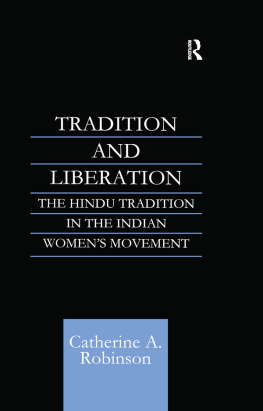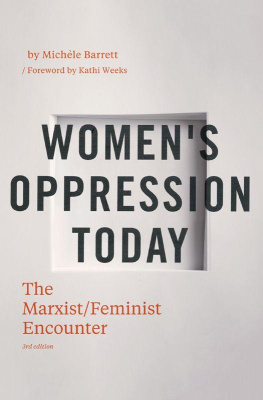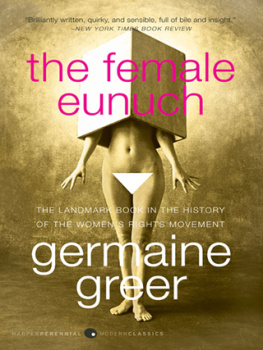Marxism and Womens Liberation
Judith Orr
Judith Orr is the editor of Socialist Worker and the author of Sexism and the System: A Rebels Guide to Womens Liberation (Bookmarks, 2007).
MARXISM
AND
WOMENS
LIBERATION
Judith Orr

Marxism and Womens Liberation
By Judith Orr
Published 2015 by Bookmarks Publications
c/o 1 Bloomsbury Street, London WC1B 3QE
Bookmarks Publications
Cover design by Yuri Prasad
Typeset by Peter Robinson
Printed by Russell Press
ISBN print edition: 978 1 909026 97 1
ISBN kindle: 978 1 909026 98 8
ISBN ePub: 978 1 909026 99 5
ISBN PDF: 978 1 910885 00 0
Contents
Acknowledgements
The single authors name on a book cover never tells the whole story of collective effort that has gone into its production. I owe many people thanks for their role in making this book possible.
First I want to thank Sally Campbell as the publisher. She has seen it through from when it was no more than a few chapter titles and has been a source of constant encouragement and political feedback.
Thank you to Yuri Prasad for a great cover design, and to Lina Nicolli, Peter Robinson, Eileen Short and Carol Williams for all their work on production. Im grateful to Sarah Bates, Alex Callinicos, Esme Choonara, Amy Leather and Sheila McGregor for taking time to read earlier drafts of the book and give comments. Of course any flaws are my own.
I very much appreciate that Charlie Kimber and Simon Basketter ensured I was able to take time away from Socialist Worker to write. Special thanks must go to Martin Smith for all his support, and my good friends Anna Gluckstein, Emma Bircham and Fiona Watson for always being there.
I was lucky enough to witness some of the 18 days in Cairos Tahrir Square when the Egyptian Revolution erupted. Women were central to the struggle from the first day but are now victims of the counter-revolution.
So I want to dedicate this book to Revolutionary Socialist and human rights lawyer Mahienour el-Massry, who as I write is in an Egyptian prison for her role in the revolution. But Mahienour always insists that she with her high profile does not need solidarity as much as the countless women she shares cells with, who will only be remembered with pride at their own family gatherings. In that spirit this book is for Mahienour and all Egypts political prisoners.
1
Great expectations
Why are women, half the human race, still discriminated against? Women are overrepresented among the poorest on the planet, they face oppression in all societies and are treated as inferior beings in a million different ways. Why are women more often to be found on the sticky floor of low pay than above the glass ceiling where the rich and powerful reside? In Britain two thirds of those on the minimum wage are women and only six of Britains top 100 companies are run or chaired by a woman. In fact more people called John run such companies than women.
Women on average earn around 18 percent less than men. Britain has fallen out of the top 20 countries for gender pay parity because the gap between mens and womens incomes is so wide. The latest economic crisis has hit working class people hard, but it has hit working class women the hardest. Women in Britain have suffered as much as 85 percent of the cost of the cuts and austerity launched by the Tory led coalition government of 2010-15. This is calculated on the basis of the impact of the cuts in tax credits and other welfare benefits on which working class women are more reliant. Women also disproportionately work in public sector jobs which have been cut or have seen their pay slashed or frozen.
The sexual freedom we thought had been won in the struggles of the 1960s appears to have just given us the opportunity to be even more crudely defined as sex objects than ever before. Old fashioned sexism hasnt gonethe Sun newspaper still insists on putting pictures of semi-naked women on its page three.
But today there is also a different sort of sexismraunch culture. It has a twist; we are meant to revel in it as ironic. No longer is stripping demeaning, its been rebranded as lap dancing and sold as empowering. In the 19th century Karl Marx wrote of the ability of capitalism to turn intrinsic parts of our humanity into alien objects to be bought, sold and possessed. This affects even the most intimate aspects of our lives, including our sexuality, which are transformed into things alien from us. New freedom of expression, which was hard fought for, is distorted by the systems drive to turn everything into a source of profit.
Womens sexuality has become trapped in a new cage of clichd stereotypes in the name of liberation. Womens bodies are treated as sex objects whether they are an Olympic champion encouraged to pose in bikinis for magazine covers or a shop worker whose contract mandates the wearing of make up.
Women feel the pressure to conform to ever more exaggerated caricatures of what is deemed to be sexy, while men are encouraged to see themselves as helpless prisoners of their testosteronesexually aggressive and insatiable. A fresher arriving at any university campus in Britain will find sexism has become a routine part of student life. They will be faced by posters, flyers, club nights and pole dancing societies using sexist stereotypes of women which are flaunted as fun and proof of liberated times. The more traditional sources of sexist behaviour have thrived in this atmospherethey dont feign irony, they simply have more confidence to express pure misogyny. For example protests forced the students union of the London School of Economics to suspend the Rugby Club in 2014 for a year after it gave out a grossly offensive leaflet at freshers fair calling women mingers and slags.
Sexual harassment is not just a problem for young people in college, as the Everyday Sexism project has shown. Thousands of women have posted their experiences online and it makes sobering reading. A YouGov poll found that two-thirds of people agree that sexism is still a problem in the workplace, three-quarters of women compared with 56 percent of men.
It can sometimes feel like the clock has turned back and the struggles of the past were in vain. But women have made important material gains that would have seemed completely out of reach by previous generations. A hundred years ago women did not have the right to vote and had marched in their hundreds of thousands to demand suffrage. Fifty years ago abortion was illegal and a woman died every ten days after going to the back street. In Northern Ireland abortion is still illegal today. Only 25 years ago rape in marriage was not a crimea wife was seen to have consented to be sexually available to her husband whenever he wanted.
Today in Britain women can divorce, access safe abortion and have a right to equality under the law. Women have grown up with the assumption that they will work for a living and have financial independence from men. They have access to jobs and a level of education denied to their grandmothers. The number of women going to university has outstripped men since 1992. Women have never had more freedom in their personal lives. They have won the right to express their sexuality, they can choose never to marry, to have children outside marriage without being ostracised or not to have children at all.
Some women have done very well. In fact we are often told that women in the West are living in a golden age. The US trade advertising magazine Ad Age described our time as a new era in American society and culture: The New Matriarchy because women have increased their economic power in society and taken on more and more leadership roles.
Next page








